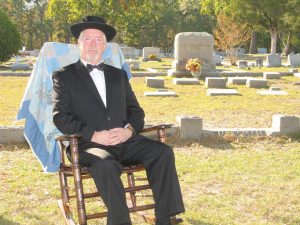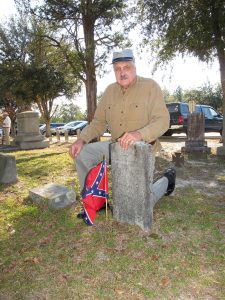
The gravestone of Blythewood founding father George P. Hoffman can be seen in the background as Town Councilman Eddie Baughman relates the story of the Hoffman House, built by Hoffman, which is now the Town Hall. (Photo/Barbara Ball)

Dressed as a Confederate Soldier, Fritz Jolly kneels beside the grave of Drummer Boy William Woodward Macon who is interred under a shade tree in the Sandy Level Baptist Church. (Photo/Barbara Ball)
BLYTHEWOOD (Nov. 3, 2016) – A tour through Blythewood history was conducted Sunday afternoon in the cemetery of Sandy Level Baptist Church. Sponsored by the Blythewood Historical Society and Shives Funeral Home, the tour began inside the circa 1856 church, then moved outside into the cemetery where guides waited at the gravestones of some of Blythewood’s founding fathers and their families as well as more recent residents of the Town.
Blythewood’s Wade Hampton Dorsey, dressed in period clothing, stood at the gravestone of his ancestor, plantation owner and physician turned educator, Dr. Samuel Wingard Bookhart. As the tour approached the gravestone, Dorsey, a former Blythewood Town Councilman and former president of the Historical Society, spoke in the role of Bookhart, imparting the family’s history.
“I joined Sandy Level Baptist Church in 1856 when I was 27, and remained a member until the day I died. We were building a new meeting house, this very one that still stands today. Cynthia and I gave $700 to paint it. I served as Clerk for almost 50 years! In those days whites and blacks, slave and free attended church here together . . .”
After the Bookharts built a school for girls on the grounds where Cobblestone Park now sits, a teacher at the school suggested naming the school The Blythewood Female Institute after the surrounding beautiful woods.
“By February of 1865, the War for Southern Independence was nearly lost,” Dorsey, as Bookhart, continued. “General Sherman took Columbia on Feb. 17 and burned it to the ground. We could easily see the fires from here. By Feb. 20, the Yankees were at Doko. The house that Uncle Christian left me was burned in minutes, along with all the barns. I had to ride quickly away to avoid arrest. The soldiers set the Institute buildings afire, but Cynthia and the girls, along with the servants, were able to quell the flames. They destroyed almost everything in their path . . .”
Standing next to a nearby headstone engraved with the title “Drummer Boy,” Fritz Jolly, dressed in a Confederate uniform, spoke as William Woodward Macon, who was 16 when he enlisted in the Confederate Army in Alabama and was assigned to beat drum signals during battle. After the war he came to Blythewood, which was then in Fairfield County and, in 1874, married Sarah Vann, the daughter of the Rev. Robert Vann. The couple had six children, and today that Drummer Boy rests beneath a large shade tree outside the church.
In another section of the cemetery, Town Councilman Eddie Baughman recalled George Peter Hoffman who built the Hoffman House in 1855 as a gift for his new bride, Jane Ruff Hoffman. Hoffman, who was a merchant, farmer, lumberman, section master for the railroad and railroad contractor and ran a sawmill, was the Blythewood Postmaster from 1856 to 1866 and off and on again through 1877. The Hoffman House was placed on the National Register in 1986 and became Blythewood’s Town Hall in 2002.
From 3 to 6 p.m., visitors toured 14 grave sites, learning from storytellers about the men and women who left their marks on Doko, now known as Blythewood.















